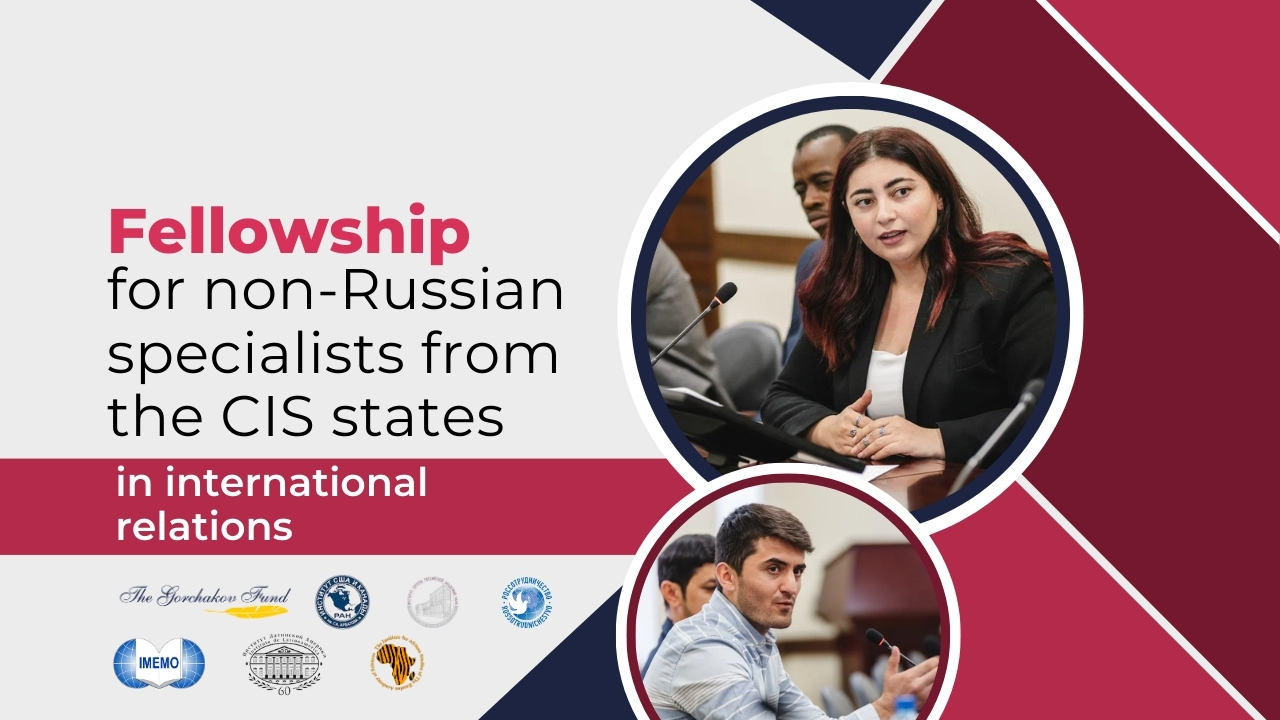InteRussia Team is launching the call for applications to join the InteRussia fellowship programme in international relations for specialists from the CIS states. The programme partners will include the Primakov Institute of World Economy and International Relations (IMEMO) of the Russian Academy of Sciences, Arbatov Institute for US and Canada Studies of the Russian Academy of Sciences, Institute of Europe of the Russian Academy of Sciences, Institute of Latin American Studies of the Russian Academy of Sciences, and Institute for African Studies of the Russian Academy of Sciences.
The topic of the programme is titled Polycentric world: new trends and challenges.
What the participants may expect?
During the fellowship, the participants will have an opportunity to:
Fellowship date: from 29 September to 27 October.
Location: Moscow, Russia.
Working language: Russian.
Eligibility
Non-Russian specialists who meet the following requirements are welcome to participate:
Selection criteria
Applicants for the fellowship will be selected on a competitive basis. The selection criteria include:
How to participate?
Watch the video for more details on the application process.
The organisers provide:
The participants pay for:
The regulation on fellowships for non-Russian specialists is available at the link.
If you are having trouble registering on the website or submitting an application, email us at interussia@yandex.ru.
The deadline for applications is 31 August, 23:59 Moscow time.
All the candidates will be informed about the results via email.
The topic of the programme is titled Polycentric world: new trends and challenges.
What the participants may expect?
During the fellowship, the participants will have an opportunity to:
- immerse themselves in the life of the Russian scientific community;
- visit government agencies;
- take part in expert sessions at Russian scientific and analytical centres;
- work under the guidance of top Russian scholars who study international relations at the institutes of the Russian Academy of Sciences;
- draft a scientific research of 15-25 thousand characters.
Fellowship date: from 29 September to 27 October.
Location: Moscow, Russia.
Working language: Russian.
Eligibility
Non-Russian specialists who meet the following requirements are welcome to participate:
- Nationals of Belarus, Kazakhstan, the Kyrgyz Republic, Moldavia, Tajikistan, Turkmenistan, Uzbekistan, as well as the countries of the South Caucasus.
- Age 25-35.
- Place of residence outside of Russia.
- professional command of Russian (at least C1 level).
- Submission of an individual research proposal on the selected topic.
- PhD degree or at least 3 years of working experience in academic institutions/think tanks or postgraduate studies in progress.
Selection criteria
Applicants for the fellowship will be selected on a competitive basis. The selection criteria include:
- The academic level, relevance, maturity and feasibility of the applicant’s research proposal;
- Academic publications;
- Details from letters of recommendation (x2-3);
- Other research and expert activities of the applicant (participation in conferences, grants, scientific fellowships, expert publications, comments for mass media, etc.)
- Results of the online interview.
How to participate?
- Sign up on the English version of the Gorchakov Fund website. If you did not receive a registration verification email, check your spam folder.
- Navigate to the “My Projects” section, click on the “Create application” button, select the “InteRussia – International Relations – CIS states” contest and hit “Yes.”
- Fill in ALL mandatory fields.
- Click on the “Submit” button in the “Apply” section and wait for the status to change from “Preparing” to “Submitted.”
Watch the video for more details on the application process.
The organisers provide:
- travel from an applicant’s place of residence to Moscow and back;
- double room in a hotel
- visa processing;
- medical insurance;
- scholarship for the duration of the fellowship in the amount of 30,000 rubles.
The participants pay for:
- meals during their fellowship;
The regulation on fellowships for non-Russian specialists is available at the link.
If you are having trouble registering on the website or submitting an application, email us at interussia@yandex.ru.
The deadline for applications is 31 August, 23:59 Moscow time.
All the candidates will be informed about the results via email.
The InteRussia program on international relations is implemented by the ANO "Mezhdunarodniki" in cooperation with the Gorchakov Fund, Rossotrudnichestvo, the Primakov National Research Institute of World Economy and International Relations of the Russian Academy of Sciences, the Institute for U.S. and Canadian Studies of the Russian Academy of Sciences named after Academician G.A. Arbatov, the Institute of Europe of the Russian Academy of Sciences, the Institute of Latin America of the Russian Academy of Sciences, and the Institute for African Studies of the Russian Academy of Sciences, with grant support from the Presidential Grants Fund.




